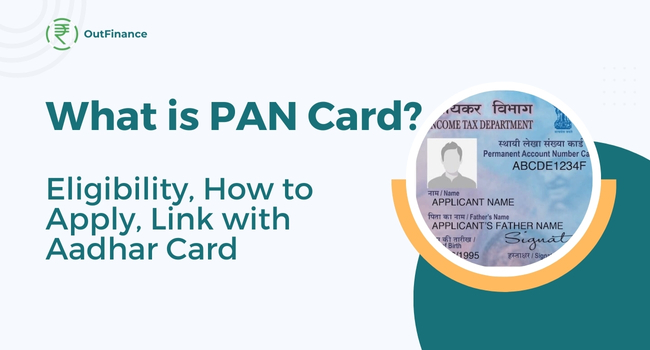What is PAN Card? Eligibility, How to Apply, Link with Aadhar Card

I’m writing this article for kids basically, because I believe anyone more than 15 years old in India knows what a PAN card is and why it exists. At least everyone has a fair idea.
A PAN card, stands for Permanent Account Number card, is a unique identification number issued by the Income Tax Department of India. It consists of a 10-character alphanumeric code that is assigned to every individual, business, or entity that conducts financial transactions or pays taxes in India.
PAN card basically helps the government to track various financial transactions and ensures that individuals and businesses are paying the correct taxes.
The PAN card serves as an essential tool for tax administration in India. In addition to its tax-related uses, it also acts as a form of identification in various situations, such as opening a bank account, making large financial transactions, or applying for loans.
Understand the PAN Card in Detail
A PAN is a 10-character alphanumeric number. Here’s a breakdown of what each part means:
- First Five Characters: These are letters.
- Next Four Characters: These are numbers.
- Last Character: This is a letter.
For example, a typical PAN might look like this: ABCDE1234F.
Here’s how it works:
- First three letters: These are random alphabets.
- Fourth letter: It signifies the type of PAN holder. For instance, “P” stands for an individual, “C” for a company, “H” for a Hindu Undivided Family (HUF), and so on.
- Fifth letter: This is the first letter of your surname (for individuals) or the name of the company or entity.
- Next four digits: These are numbers assigned to make the PAN unique.
- Last letter: This is a check digit that ensures the accuracy of the PAN.
Why is a PAN Card Important?
A PAN card has several important uses in India, particularly for tax-related and financial transactions.
1. Taxation Purposes
The PAN card is required for all individuals and entities that pay taxes in India. The government uses it to track tax payments, returns, and financial activity.
Filing Income Tax Returns: You must quote your PAN when filing income tax returns. Without it, you cannot complete the tax filing process.
Tracking Financial Transactions: PAN allows the Income Tax Department to track your financial activities to ensure you are paying taxes correctly. Any large financial transaction, such as a high-value purchase or sale, must include your PAN.
2. Banking and Financial Transactions
The PAN card is mandatory for a wide range of financial transactions in India.
Opening a Bank Account: Whether you want to open a savings or current account, banks require your PAN for identification and compliance purposes.
Fixed Deposits: If you are making a fixed deposit of ₹50,000 or more, the bank will ask for your PAN.
Buying and Selling Property: When you buy or sell a property valued above ₹10 lakhs, quoting your PAN is mandatory.
Investments in Mutual Funds and Stocks: PAN is needed when you invest in mutual funds, stocks, or bonds. This helps the government track your investments and ensures that taxes on capital gains are correctly paid.
3. Proof of Identity
The PAN card is widely accepted as a valid proof of identity across India. Whether you are applying for a loan, renting an apartment, or purchasing large amounts of jewelry, the PAN card is often requested to verify your identity.
Who Needs a PAN Card?
A PAN card is necessary for various individuals and entities.
1. Individuals
Every individual who earns a taxable income in India must have a PAN card. It’s essential for filing taxes and completing large financial transactions. Even if you’re not earning yet but plan to invest, purchase property, or open a bank account, having a PAN card is useful.
2. Businesses
Businesses, firms, and companies must also have a PAN card. This is required for paying corporate taxes, conducting business transactions, and opening corporate bank accounts.
3. Foreign Nationals and NRIs
Even foreign nationals or Non-Resident Indians (NRIs) who have financial dealings or income in India need a PAN card. This applies to those investing in Indian stock markets, buying property in India, or earning income from Indian sources.
How to Apply for a PAN Card?
The process for applying for a PAN card is simple and can be done online or offline.
1. Online Application
You can apply for a PAN card online through official websites such as NSDL (National Securities Depository Limited) or UTIITSL (UTI Infrastructure Technology and Services Limited). Here’s a step-by-step guide:
- Visit the Official Website: Go to the NSDL or UTIITSL websites and navigate to the PAN application section.
- Fill Out the Form: Fill in the required details using Form 49A (for Indian citizens) or Form 49AA (for foreign citizens).
- Upload Documents: You’ll need to upload scanned copies of proof of identity, proof of address, and a passport-sized photograph.
- Pay the Fee: A small fee is charged for the PAN application, which can be paid online.
- Submit the Application: After submitting, you’ll receive an acknowledgment number that allows you to track your application status.
2. Offline Application
For those who prefer the offline method:
- Download or collect Form 49A from a PAN service center.
- Fill out the form with all the necessary details.
- Attach the required documents, such as proof of identity, address, and photograph.
- Submit the form to the service center and pay the processing fee.
- The PAN card will be sent to your address by post.
Documents Required for PAN Card Application
The documents required for a PAN card application vary based on the applicant.
1. For Individuals
- Identity Proof: Aadhar card, passport, or voter ID card.
- Address Proof: Utility bills, Aadhar card, or driving license.
- Proof of Date of Birth: Birth certificate, matriculation certificate, or passport.
2. For Businesses
- Certificate of Incorporation: For companies or business entities.
- Registration Documents: Proof of registration of the business.
3. For Foreign Nationals and NRIs
- Copy of Passport: To verify nationality.
- Proof of Address: Overseas address proof.
- Visa or Resident Permit: If applicable.
Common Uses of a PAN Card in Daily Life
A PAN card is required for a range of everyday financial activities.
1. Loan Applications
When applying for a home loan, car loan, or personal loan, lenders require a PAN card to verify your financial history and identity.
2. Purchasing Jewellery
If you buy jewellery worth more than ₹2 lakhs, quoting your PAN is mandatory to ensure tax compliance.
3. Insurance Premium Payments
When paying insurance premiums exceeding ₹50,000 in a year, you need to provide your PAN for verification.
4. International Travel
When making payments for foreign travel exceeding ₹50,000, providing your PAN ensures transparency in the transaction.
Consequences of Not Having a PAN Card
Not having a PAN card can lead to difficulties in financial transactions and higher tax deductions.
1. Higher TDS (Tax Deducted at Source)
If you do not have a PAN card, the TDS on your income could be deducted at a higher rate. For example, on fixed deposits, the TDS rate may increase from 10% to 20% without a PAN card.
2. Difficulty in Financial Transactions
Many financial transactions, such as purchasing property, investing in mutual funds, or even opening a bank account, require PAN. Without it, these transactions become difficult or impossible.
3. Legal Penalties
In certain cases, not having a PAN when required can result in penalties from the Income Tax Department. For example, not quoting PAN for high-value transactions could attract fines.
Linking PAN with Aadhaar
The Indian government has made it mandatory to link your PAN with Aadhaar, which is another unique identification number in India.
Why It’s Mandatory
Linking PAN with Aadhaar helps prevent fraud and ensures that each person has only one PAN. It also helps in quicker tax processing and refunds.
How to Link PAN with Aadhaar
- Step 1: Visit the Income Tax e-filing portal.
- Step 2: Enter your PAN and Aadhaar details.
- Step 3: Verify the details and submit.
- Step 4: Once linked, you will receive a confirmation.
Conclusion
A PAN card is an essential document for every individual, business, and foreign national who has financial dealings in India.
It is mandatory for filing taxes, conducting large financial transactions, and even acting as proof of identity. Without a PAN card, you may face higher tax deductions and difficulty in completing everyday financial tasks.
Applying for a PAN card is simple, and its uses go far beyond taxation.
Whether you’re opening a bank account, investing, or applying for a loan, having a PAN card ensures smooth financial transactions and compliance with Indian tax laws.

0 Comments